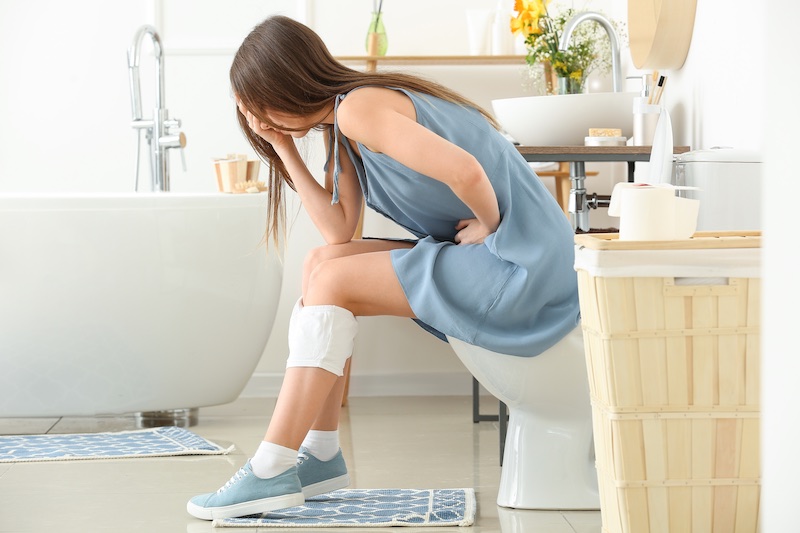Introduction
Constipation is such a common issue among both adults and children, but often goes under treated or ignored. Constipation can greatly impact on quality of life and can also exacerbate other health conditions, so getting to the root cause of the issue is important for overall health. If constipation is an issue for you, read on to discover some of the most common root causes, as well as naturopathic strategies to help improve your digestive health.
What is Constipation?
Constipation means you are either not having a bowel movement or are finding it difficult to pass a bowel movement (or both). Ideally, we should be opening our bowels daily and stools shouldn’t be difficult to pass – that is, we shouldn’t need to strain or spend long periods of time on the toilet to get things happening.
Medically speaking, chronic constipation generally means fewer than 3 bowel movements per week. In reality, however, we should ideally be opening our bowels every single day. Why? Because our bowels are one of our major channels of elimination for getting rid of toxins and waste products that the body doesn’t need. If we aren’t opening our bowels often enough, these waste products sit stagnant in the bowel, causing inflammation. They may even be reabsorbed by the bowel and re-enter circulation, increasing the toxic burden on the body and creating additional stress on organs such as the liver, who need to process these waste products all over again.
Symptoms of Constipation:
- Stools are difficult to pass: Straining or extended periods of time sitting on the toilet are required
- You feel as though your bowel movement was “incomplete” after evacuating (as if there is more to pass but you are unable to pass anything more)
- Stools are hard and may be smaller than usual
- Abdominal pains from trapped gas can also occur
What Causes Constipation?
There are many, many different causes of constipation and for many people their constipation will be due to a combination of causes. Below are some of the major causes of chronic constipation.
Insufficient water intake
Stools are made up of a high percentage of water, which is what keeps the stools soft enough to move through the digestive tract efficiently. If you aren’t drinking enough water, your stools can end up being too dry and hard, which slows down their transit in the bowel.

Insufficient fibre in the diet
Fibre (undigestible carbohydrates in the diet) is found in foods such as vegetables, fruits and legumes. It is vital for healthy bowel movements, as it makes up the “bulk” of the stool, as well as being a food source for the bacteria in the gut, which play a role in normal stool formation and gut function. Having sufficient bulk in the stool triggers the gut to rhythmically contract (a process called peristalsis), moving the stool through the digestive tract ready for excretion. Too little fibre means this process doesn’t occur properly, leading to slower transit time.
Low physical activity
Physical activity also helps to stimulate the bowel to move stools through the digestive tract.
Certain medications and nutritional supplements
Certain medications, including some pain-killers, antacids and anti-depressant medications, are known to increase the risk of constipation. Nutritional supplements containing iron or calcium can also lead to constipation.
Stress and anxiety
The gut-brain connection is a powerful regulator of our health. Stress and anxiety activate our body’s fight-or-flight response, putting us into a state known as parasympathetic dominance. When in this state, our body down-regulates certain biological functions, including digestion, so that it is ready to respond to perceived imminent threats. This means impaired digestion and, as a result, constipation.
Dysbiosis
The bacteria in our guts are important for so many aspects of our health, and it’s not surprising that they play a role here, too. Our gut bacteria are the biggest producers of serotonin in the body, which is not only our “happiness” molecule, but is also important in maintaining normal gastrointestinal function. Dysbiosis and reduced intestinal serotonin levels can lead to poor gut motility and contributes to chronic constipation.
Pregnancy
Hormonal changes in pregnancy lead to the slowing down of the gastrointestinal tract, which aids in absorbing additional nutrients from food as it passes through. The downside, however, is that this slower transit time can lead to constipation.
Pelvic Floor Dysfunction
A weakened pelvic flood may mean there is insufficient muscle tone for you to properly expel the stool.
Other causes:
- Ignoring the urge to pass stools
- Over-use of laxatives – this can lead to reliance on laxatives in order to have a bowel movement
- Medical conditions such as IBS, food intolerances, diabetes, Parkinson’s disease or multiple sclerosis
Constipation in Kids
Constipation is also a common issue for children, particularly between the ages of 2 and 4 when potty training begins. Whilst some children may experience constipation due to slow bowel transit, up to 95% of chronic constipation in children is due to withholding behaviour, sometimes triggered by a previous painful bowel movement. Withholding and ignoring signals to open their bowels means the stool remains in the large intestine for too long and becomes dry and hard, making it more difficult to pass and further exacerbating the issue.
Health Consequences of Chronic Constipation
Haemorrhoids
Haemorrhoids are swollen, distended veins which can occur inside or outside the rectum as a result of straining to open your bowels. Haemorrhoids can be painful which can worsen constipation by leading to hesitancy and resisting the urge to open your bowels.
Dysbiosis
Dysbiosis (changes to the normal microflora balance in your gut) may be a cause or an effect of constipation. To learn more about the importance of a healthy microbiome and the health consequences of dysbiosis, click here.
Waste Product Reabsorption
As discussed above, when stools sit in the large intestine for too long, the body begins to reabsorb some of the waste products that are meant to be eliminated. This can lead to issues with other health conditions such as hormonal issues like PMS, as excess oestrogen that would otherwise have been neutralised and eliminated from the body re-enters circulation, contributing to continued oestrogen dominance. The recirculation of waste products also puts additional strain on the liver, which may lead to fatigue, headaches and other issues.
Combating Constipation, the Naturopathic Way
Fortunately, there are many effective strategies for combatting chronic constipation without resorting to harsh laxatives. Check out the tips below from Sydney naturopath Performance in Health for some of the common effective strategies to beat constipation.
Dietary Strategies
Increase your fibre intake:
- Fibre is the undigestible portion of carbohydrates which are important for healthy bowel movements.
- Include a variety of fibre-rich foods.
- Fruits and vegetables of different colours and textures (consider leaving the skin on vegetables such as potatoes and carrots for added fibre, but be sure to thoroughly wash before preparing).
- Legumes, nuts and seeds are also good sources of fibre, as well as being protein-rich foods.
- Fibre supplements, such as flaxseed meal and slippery elm powder can also be used, however they must be taken with sufficient water, or else they may exacerbate the issue. It’s best to discuss this with your naturopath before using.
- If you need to increase your fibre intake, it’s best to increase it slowly over a period of time to prevent bloating and gas issues.
Increase water intake:
- As a rule of thumb, around 2-2.5L of water per day is required for an adult, and more if you’re physically active.
- Increase prebiotic foods.
- Prebiotic foods feed the beneficial bacteria that support healthy bowel movements.
- Foods such as apples, garlic, onions, and legumes are all excellent sources of prebiotics.
- Reduce your intake of low-fibre foods such as meats, eggs, dairy and highly processed foods like white bread, cakes – reducing your intake of these foods makes way in your diet for high fibre foods.
- Lemon juice in warm water before meals stimulates digestion and can help with constipation.
- Eat “bitters” before main meals.
- Bitter foods such as rocket, or even herbal bitters such as gentian, can help to improve overall digestive function.
- If you do wish to try herbal bitters, speak to your naturopath first.
Supplements
Probiotics:
- A variety of probiotics have been shown to help improve bowel function in constipation sufferers.
- Probiotics have also been shown to be helpful for children with chronic constipation.
Magnesium:
- Some magnesium supplements depending on the type have been shown to help in chronic constipation by acting as an osmotic laxative, stimulating the intestines to draw additional water into the bowels.
Herbal medicines:
- Depending on the cause of your constipation which must be understood first, some safe and effective herbs can help to improve constipation alongside other treatment strategies. It is important that a trained herbalist prescribes these herbs as they must be used appropriately. Herbs such as Dandelion root, Globe artichoke, Senna, Yellow Dock, Rhubarb, Magnolia, Ginger and Licorice are some of the herbs prescribed.

Lifestyle Strategies
Daily physical activity:
- Aim for 20-30 minutes of moderate intensity exercise every day – a brisk walk (fast enough to break a sweat) is a great place to start.
- Bowel “re-training”.
- Sitting on the toilet at the same time each morning (for example, after breakfast) can help to “retrain” your brain to associate a certain time of day with opening your bowels, helping you to initiate a regular bowel movement. After a main meal is an ideal time for this, as it takes advantage of the body’s reflex system to increase peristalsis when the stomach is full.
- Bowel “retraining” can be a particularly important strategy for assisting in constipation in children, who should be encouraged to sit on the toilet for 5 minutes after each main meal and try to open their bowels.
- Ensuring optimal posture for bowel movements is equally important. A relaxed posture with feet comfortably supported on a foot stool optimises posture for bowel movements – a “squatting” type position is ideal.
- For children with functional constipation, using a reward system and even a daily diary can also be beneficial.
- Don’t ignore the urge to go! Even if you are unsuccessful in opening your bowels, responding to bowel movement queues by sitting on the toilet helps to retrain your brain to respond appropriately to these queues in future.
What About Over the Counter Laxatives?
Over the counter laxatives are often the first port of call for constipation sufferers, however, as discussed above, frequent use of laxatives to initiate a bowel movement can lead to your body relying on these for every bowel movement. Instead, think of laxatives (even “healthy” and “natural” ones) as being for short-term use only. Once the initial constipation is relieved, it’s best to focus on longer term strategies and addressing the root cause of the issue, to prevent constipation from recurring.
To find out more, contact Performance in Health today for an initial appointment.
References
Cao, H., Liu, X., An, Y., Zhou, G., Liu, Y., Xu, M., Dong, W., Wang, S., Yan, F., Jiang, K., & Wang, B. (2017). Dysbiosis contributes to chronic constipation development via regulation of serotonin transporter in the intestine. Scientific Reports, 7.
Dimidi, E., Christodoulides, S., Scott, S. M., & Whelan, K. (2017). Mechanisms of action of probiotics and the gastrointestinal microbiota on gut motility and constipation. Advances in Nutrition, 8(3), 484–494.
Forootan, M., Bagheri, N., & Darvishi, M. (2018). Chronic constipation: A review of the literature. Medicine (Baltimore), 97(20).
Hechtman, L. (2012). Clinical naturopathic medicine. Elsevier Australia.
Koppen, I. J. N., Lammers, L. A., Benninga, M. A., & Tabbers, M. M. (2015). Management of functional constipation in children: Therapy in practice. Pediatric Drugs, 17, 349–360.
Levy, E. I., Lemmens, R., Vandenplas, Y., & Devreker, T. (2017). Functional constipation in children: Challenges and solutions. Pediatric Health, Medicine and Therapeutics, 8, 19–27.
Mori, S., Tomita, T., Fujimura, K., Asano, H., Ogawa, T., Yamasaki, T., Kondo, T., Kono, T., Tozawa, K., Oshima, T., Fukui, H., Kimura, T., Watari, J., & Miwa, H. (2019). A randomized double-blind placebo-controlled trial on the effect of magnesium oxide in patients with chronic constipation. Journal of Neurogastroenterology and Motility, 25(4).










